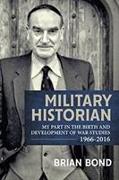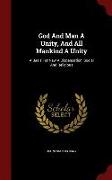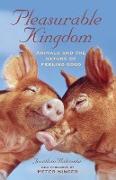Military Historian: My Part in the Birth and Development of War Studies 1966-2016
BücherAngebote / Angebote:
This is the story of how a boy from a poor background benefited from the new opportunities available in the post-1945 era to attend a very good grammar school, gain entry to Oxford University and eventually became a professor at a top grade university, King¿s College, London.Early chapters show how hard it was to get a foothold on the lowest rungs of the academic ladder, particularly in a subject, military history, where there were virtually no established positions. No matter how talented and industrious, good fortune played a crucial role, as in so many careers, in helping Brian Bond at a critical stage. By a remarkable coincidence, since Brian was reading some of his books at Oxford, Basil (later Sir Basil) Liddell Hart came to live in the village and promptly gave him tremendous encouragements and support. Liddell Hart, at that time probably the best known military writer in the world, provided wonderful references which, after numerous setbacks, led to junior academic appointment at Exeter and Liverpool universities. Equally important Liddell Hart introduced Brian to Michael Howard (now Sir Michael Howard OM) who was just beginning to pioneer the study of military history-war studies at King¿s College, London. Michael had a difficult time in persuading the academic establishment that this was a respectable and very important new field of study, but in 1965 he succeeded in setting up a Department of War Studies, and in the following year recruited Brian as a Lecturer in Military History. Promotion was necessarily slow in a tiny department, but Brian was eventually elevated to Reader and then Professor.The central chapters in this personal memoir provide a frank account of what it was like to teach military history at all levels (but especially to MA and PhD candidates) in the late 20th century. From the outset the students were drawn from virtually every country in the free world and competition for entry was tough. Numbers of staff and students increased steadily through the 1970s and 1980s, but then there was a sudden dramatic expansion as the Department admitted undergraduates for the first time. The range of subjects taught also widened impressively with more emphasis placed on contemporary Strategic Studies. But the ¿philosophy¿ inculcated by Michael Howard, namely the disinterested study of warfare in a broad social and political context continued to provide the Departments teaching.On the personal level Brian Bond contrasts successes and achievements with ¿bad days¿ in the office and the lecture hall which will strike a chord with all fellow teachers. He also pens a lively account of some of his overseas travels, particularly in Canada, the United States, Pakistan and Japan as well as attending numerous conferences in Europe. In the penultimate chapter ¿Books do Furnish a Room¿ he describes how and why his own books came to be written, and how they were received.The extra theme or dimension which raises this account above the personal is the remarkable development of military history during Brian Bond¿s careers. Even in the late 1950s scarcely any military history courses were offered in British universities, and there was not a single department. By 2000 the picture had changed drastically with several centres of excellence in the field and with strong interest and support from students. Since then there have been further positive developments which have been surveyed in a concluding chapter entitles ¿The Legacy¿. Since Brian retired in 2001 he has had only a marginal connection with these later trends but has been given invaluable help in this survey from several colleagues, especially Sir Hew Strachan and Professor Martin Alexander.It is not for the author to assess his own contribution to the development of military history-war studies, nor to claim that the Department at King¿s College was the sole pioneer of the new academic subject. But Brian can accurately, if immodestly, point out that he spent thirty five years in the Department (and participating in the wider ramifications of the subject), contributed a substantial variety of books and other publications and, perhaps most importantly, supervised fifty successive PhD candidates, several of whom are now outstanding leaders in the field.
Folgt in ca. 15 Arbeitstagen




